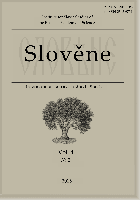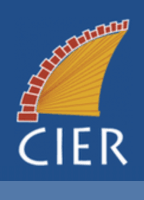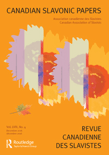
Slovene-International Journal of Slavic Studies
Scope & Guideline
Unlocking New Perspectives in Slavic Studies
Introduction
Aims and Scopes
- Slavic Linguistics and Philology:
The journal extensively covers topics related to the structure, evolution, and semantics of Slavic languages, including dialectal variations and historical linguistics. - Cultural and Literary Studies:
It emphasizes research on the literary traditions, cultural narratives, and intellectual history of Slavic societies, exploring texts and their socio-political contexts. - Historical Analysis of Slavic Regions:
The journal includes studies that investigate historical events, figures, and socio-political transformations in Slavic regions, contributing to a deeper understanding of their development. - Interdisciplinary Approaches:
Research often employs interdisciplinary methodologies, integrating perspectives from linguistics, history, cultural studies, and sociology to provide a comprehensive view of Slavic studies. - Preservation and Digitization of Manuscripts:
There is a notable focus on the preservation, analysis, and digitization of historical manuscripts, which aligns with contemporary technological advancements in humanities research.
Trending and Emerging
- Digital Humanities and Technology in Slavic Studies:
There is an increasing emphasis on the use of digital technologies for research in Slavic studies, including the digitization of manuscripts and the application of computational methods to linguistic analysis. - Identity and Language Interference:
Research exploring the interplay of identity, language, and cultural practices among diverse Slavic communities is on the rise, highlighting the complexities of modern Slavic identities. - Historical Linguistics and Etymology:
A growing interest in the historical development of Slavic languages and their etymological roots is evident, reflecting a broader trend towards understanding language evolution in historical contexts. - Cultural Memory and Historical Narratives:
Studies focusing on cultural memory, the interpretation of historical narratives, and their impact on contemporary Slavic societies have gained traction, addressing how history shapes current identities. - Political and Social Dynamics in Slavic Regions:
There is a notable trend towards analyzing the political and social transformations in Slavic regions, particularly in the context of post-Soviet transitions and contemporary geopolitical issues.
Declining or Waning
- Traditional Folklore Studies:
Research related to traditional folklore and oral histories has seen a decline, possibly due to a growing emphasis on modern cultural studies and digital humanities. - 19th Century Russian Literature:
Although still relevant, the frequency of papers focusing specifically on 19th-century Russian literature has decreased, suggesting a shift towards contemporary literature and modern-day interpretations. - Comparative Slavic Studies with Other Language Families:
The comparative analysis of Slavic languages with non-Slavic language families is less prominent, as researchers may be focusing more on intra-Slavic comparisons and unique Slavic phenomena.
Similar Journals

Mundo Eslavo-Journal of Slavic Studies
Bridging Literature, History, and LinguisticsMundo Eslavo - Journal of Slavic Studies is a prominent journal published by UNIV GRANADA, EDITORIAL, dedicated to advancing the field of Slavic studies through open access scholarship since 2004. With an ISSN of 1579-8372 and an E-ISSN of 2255-517X, the journal aims to provide a platform for interdisciplinary research, covering a wide array of topics including literature, culture, history, and linguistics of Slavic regions. Based in Granada, Spain, this journal is crucial for researchers, professionals, and students seeking to explore and contribute to the understanding of Slavic heritage and contemporary issues. With a commitment to accessibility and scholarly rigor, Mundo Eslavo invites submissions that push the boundaries of conventional discourse in Slavic studies, ensuring that critical insights and diverse perspectives reach a global audience.

BULLETIN OF THE SCHOOL OF ORIENTAL AND AFRICAN STUDIES-UNIVERSITY OF LONDON
Illuminating the Complexities of Oriental and African DynamicsBULLETIN OF THE SCHOOL OF ORIENTAL AND AFRICAN STUDIES-UNIVERSITY OF LONDON, published by Cambridge University Press, stands as a pivotal journal in the fields of Cultural Studies and History, with an impressive track record dating back to its inception in 1917. With a current impact factor that places it in the Q2 quartile for both categories, this journal gives voice to a rich tapestry of research dedicated to the complexities of Eastern and African societies. Researchers exploring the nuances of cultural interactions, historical developments, and socio-political dynamics will find this publication invaluable, as it offers peer-reviewed articles that contribute significantly to the academia surrounding these diverse fields. Although the journal is not open access, it continues to attract a dedicated readership due to its rigorous scholarly standards and reputation for quality. The BULLETIN also boasts a noteworthy Scopus ranking, reflecting its influence and reach within the global academic community. Located in the United Kingdom, the journal serves as a hub for international scholarly exchange, encouraging contributions that delve into the rich heritage and contemporary issues of Oriental and African studies.

Studi Slavistici
Cultivating Knowledge Across Slavic DisciplinesStudi Slavistici is an esteemed academic journal published by FIRENZE UNIV PRESS, focusing on the rich and diverse fields of Cultural Studies, Linguistics and Language, and Literature and Literary Theory. Since its initiation in 2004, it operates under an Open Access model, providing unrestricted access to its contents and fostering a wider dissemination of research. Based in Italy, this journal serves as a vital platform for scholars and researchers engaged in Slavic studies and beyond, encouraging interdisciplinary dialogue and innovative approaches. With its current Quartile rankings in the Q4 category across various domains, it plays a significant role in shaping dialogues within the academic community while offering insights into contemporary and historical perspectives. By maintaining an inclusive vision and engaging with critical issues, Studi Slavistici remains dedicated to advancing knowledge and scholarship in these intricate fields.

ZEITSCHRIFT FUR SLAVISCHE PHILOLOGIE
Illuminating the Nuances of Slavic LiteratureZEITSCHRIFT FUR SLAVISCHE PHILOLOGIE is a pivotal journal in the field of Slavonic philology, published by Universitatsverlag C Winter Heidelberg GmbH. Renowned for its scholarly rigor and insightful contributions, this journal serves as a key platform for researchers, professionals, and students interested in Slavic languages and linguistics. Despite its classification as a traditional subscription journal, it has maintained a consistent presence in the academic community with contributions that enhance understanding of linguistic, cultural, and literary studies within the Slavic context. With an H-index reflecting its impact and relevance, the journal has historically been indexed in Scopus, ranking in the 34th and 33rd percentiles within the Arts and Humanities and Social Sciences categories, respectively. The journal has featured a range of scholarly articles from 2002 to 2017, providing a rich repository of knowledge for those dedicated to the study of Slavic languages. For any researcher aiming to delve into this dynamic field, ZEITSCHRIFT FUR SLAVISCHE PHILOLOGIE remains an essential resource.

Jezikoslovlje
Unveiling the Dynamics of Language and SocietyJezikoslovlje, published by the Josip Juraj Strossmayer University, Faculty of Philosophy in Croatia, is an essential publication in the field of Linguistics and Language Studies. Launched in 2008 and extending its contributions to the academic community through 2024, this journal addresses a spectrum of linguistic research, facilitating scholarly dialogue around both theoretical and applied aspects of language. With a current Scopus ranking placing it in the 54th percentile in the Arts and Humanities and the 50th percentile in Social Sciences, Jezikoslovlje serves as a vital resource for researchers and students looking to engage with contemporary linguistic issues. Although it operates under a traditional access model, its indexed presence and rigorous peer-review process ensure that published works maintain a high scholarly standard, inviting contributions that advance understanding in this dynamic discipline. The journal's commitment to fostering knowledge in linguistics makes it a significant platform for academics in Croatia and beyond.

Cahiers d Etudes du Religieux-Recherches Interdisciplinaires
Bridging Disciplines for a Deeper Understanding of ReligionCahiers d Etudes du Religieux-Recherches Interdisciplinaires, published by the CENTRE INTERDISCIPLINAIRE ETUDES RELIGIEUX, is a premier open-access journal dedicated to the interdisciplinary study of religion. Since its inception in 2007, this journal has fostered scholarly communication and innovative research in the field of religious studies, providing a platform for varied perspectives that range across history, sociology, theology, and anthropology. With its ISSN of 1760-5776, it is easily accessible to researchers, professionals, and students seeking to expand their knowledge and engage with cutting-edge studies in religion. Situated in Montpellier, France, this journal plays a vital role in disseminating impactful research and enhancing academic dialogue among scholars of diverse backgrounds. By emphasizing open access, Cahiers d Etudes du Religieux ensures that significant insights into religious phenomena are available to a global audience, encouraging collaboration and exploration within the scholarly community.

SLAVIC AND EAST EUROPEAN JOURNAL
Illuminating the Diversity of Eastern European NarrativesThe Slavic and East European Journal (ISSN: 0037-6752) is a distinguished publication focused on the rich tapestry of Slavic and Eastern European cultures, languages, and literatures. Published by the Ohio State University’s Department of Slavic and East European Languages & Culture, this journal serves as a vital platform for scholars and researchers keen on exploring linguistic diversity and cultural heritage in these regions. With a wide-ranging scope, the journal addresses significant topics within Cultural Studies, Linguistics, and Literature, currently categorized in Q4 and Q3 quartiles across various academic metrics. Although it does not offer open access, anticipation is high among academics seeking to contribute or access cutting-edge research that pushes the boundaries of understanding these complex fields. As it converges from 2009 to 2024, the Slavic and East European Journal continues to uphold its commitment to academic excellence and community engagement, making it an essential resource for anyone dedicated to the study of Slavic and Eastern European traditions.

Acta Baltico-Slavica
Unveiling the Depths of Slavic History and LiteratureActa Baltico-Slavica, an esteemed academic journal published by the Polish Academy of Sciences, Institute of Slavic Studies, serves as a vital platform for the exploration of Slavic cultures, languages, and historical narratives. Since its transition to Open Access in 2014, the journal has fostered inclusivity and accessibility, allowing researchers, professionals, and students to engage with cutting-edge scholarship in the fields of History, Linguistics and Language, and Literature and Literary Theory. With a commendable impact as indicated by its category quartile rankings (Q2 in History and Literature, Q3 in Linguistics), and Scopus rankings reflecting its significance within the academic community, Acta Baltico-Slavica not only contributes to the rich tapestry of scholarship surrounding the Baltic and Slavic regions but also encourages interdisciplinary dialogue. The journal’s commitment to advancing knowledge across its fields of study makes it a prominent destination for scholarly discourse and research inquiry.

Canadian Slavonic Papers
Exploring the Depths of Slavic ScholarshipCanadian Slavonic Papers, published by Routledge Journals, Taylor & Francis Ltd, is an esteemed peer-reviewed journal dedicated to the exploration of the Slavic, Eastern European, and Russian domains, fostering scholarly dialogue across multiple disciplines. With a robust focus on Cultural Studies, History, Linguistics, and Literature, this journal has firmly established its presence in the academic community, as evidenced by its Q1 ranking across various categories in 2023. Since its inception, Canadian Slavonic Papers has been a vital platform for researchers, professionals, and students alike, providing an invaluable repository of knowledge and insights from 1977 to the present. While not an open-access journal, it remains accessible through institutional subscriptions, ensuring a wide dissemination of scholarship. Located in the United Kingdom, the journal continues to contribute significantly to the understanding of Slavic studies within a global context, making it essential reading for anyone invested in this dynamic field.

Lingua Montenegrina
Pioneering Research in Montenegrin Linguistics and Cultural StudiesLingua Montenegrina is a distinguished academic journal dedicated to exploring and advancing the fields of Montenegrin language and literature. Published by the Institute of Montenegrin Language and Literature, this journal serves as a vital platform for researchers, educators, and students interested in the nuances and development of Montenegrin linguistics, literature, and cultural studies. With an ISSN of 1800-7007, it contributes significantly to the scholarly discourse in the region and beyond. While the journal operates under a traditional subscription model, it ensures that its readership has access to high-quality research that is pivotal for understanding Montenegrin identity and cultural expressions. The commitment of Lingua Montenegrina to rigorous academic standards and its focus on regional studies positions it as an essential resource for those looking to deepen their understanding of the Montenegrin language and its literary heritage.